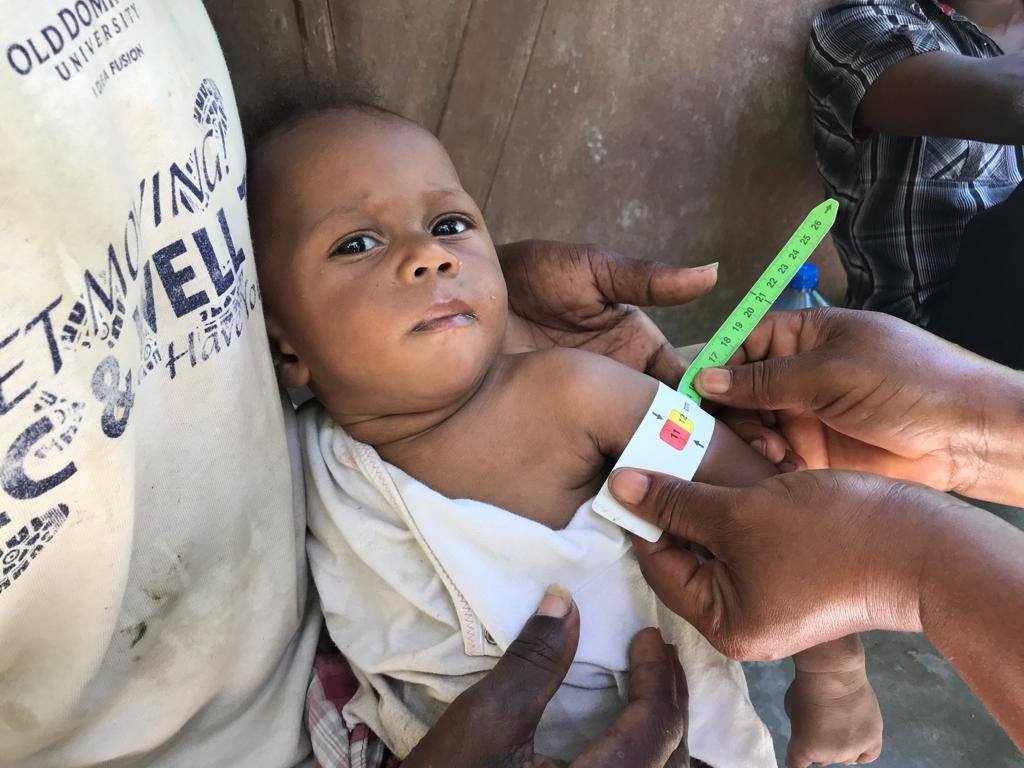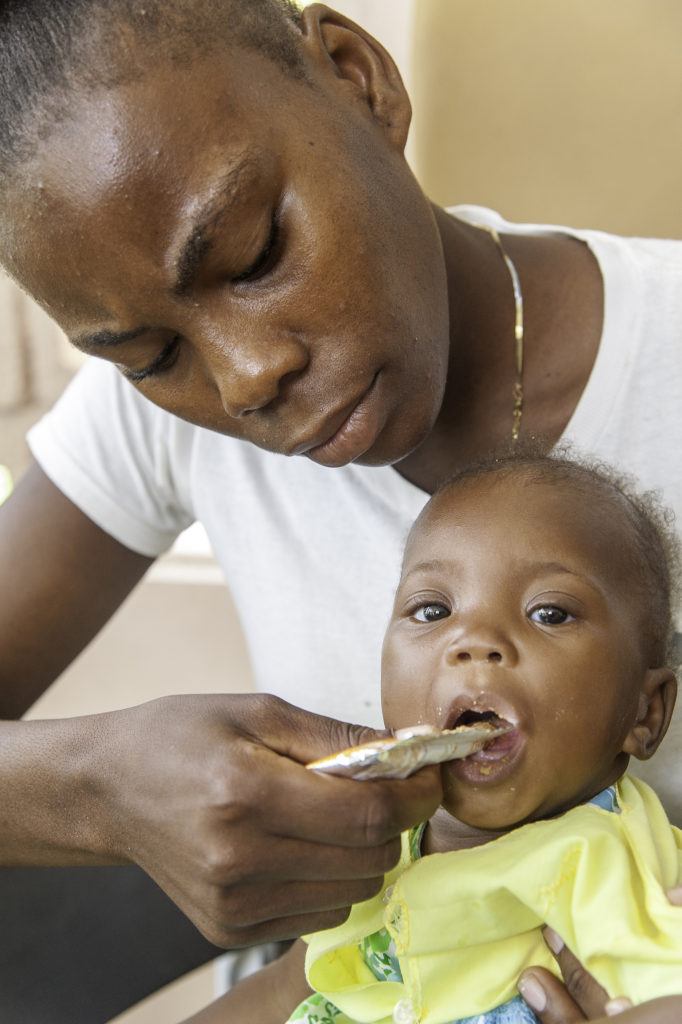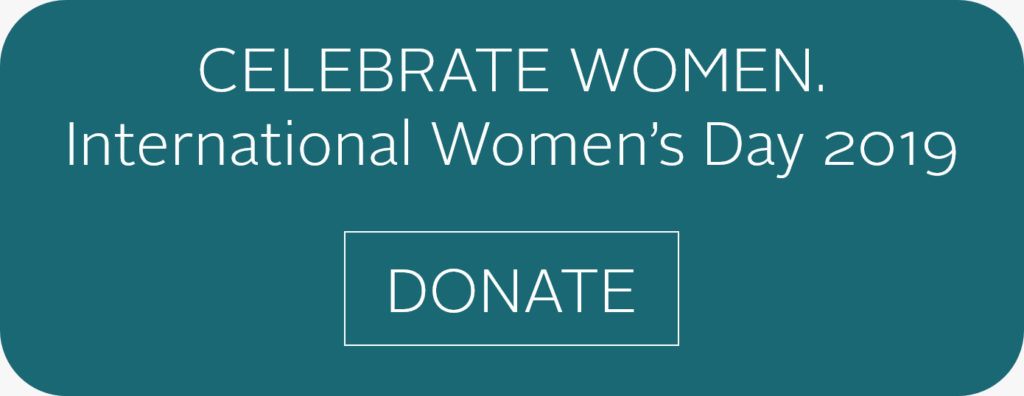Celebrating Our Sisters on International Women’s Day!
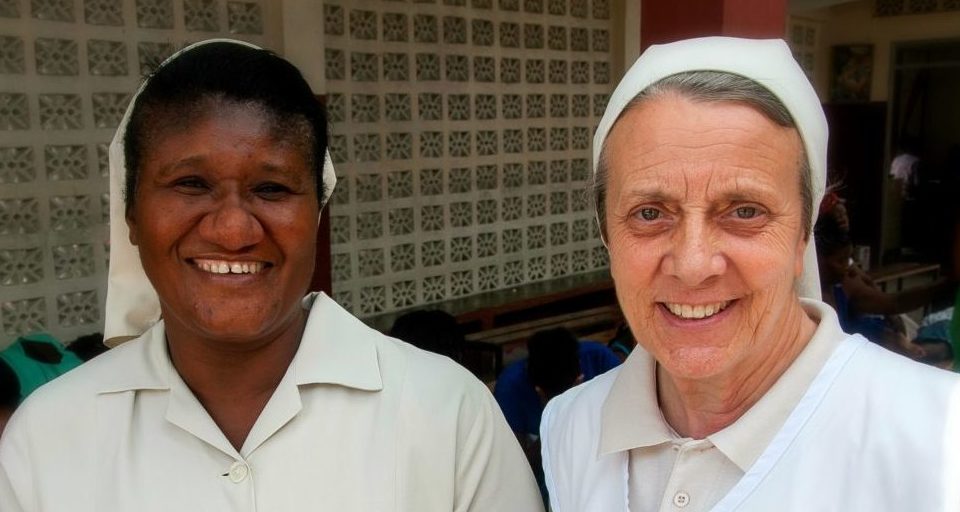
March 8th is International Women’s Day and to celebrate we are highlighting a group of women who make a huge impact in the world. Catholic sisters! As an organization that focuses on improving the health and well-being of vulnerable women (and their children), we think it’s pretty important to shine a light on the amazing Catholic sisters who play a key role in reaching the most vulnerable with essential care.
Did you know that there are over 700,000 sisters around the world, serving in some of the most remote and challenging contexts, bringing care to the sick, giving voice to the voiceless, promoting peace, and advocating for justice for the oppressed? Their selfless care and compassionate leadership brings healing, health, and hope to those who need it most.
The Heart of Cité Soleil: Sisters Bring Care to One of Haiti’s Poorest Neighborhoods
Cité Soleil is one of the poorest and most dangerous neighborhoods in Haiti. Built on a former garbage dump, and only one mile across at its widest point, this neighborhood is home to nearly 300,000 people. A constant lack of access to food, clean water, and proper sanitation is a reality of life here and all contribute to poor health outcomes, especially for women and children. But perhaps the biggest threat for the people living here is the ongoing violence and crime. Cité Soleil is one of the most dangerous areas in the Western Hemisphere.
And right in the heart of this community is the Rosalie Rendu Center for Health and Nutrition, an oasis in a neighborhood otherwise engulfed by gang violence and extreme poverty. The Rosalie Rendu Center is run by the Daughters of Charity, an international group of nuns committed to serving the most marginalized communities around the world.
Two women religious in particular, Sister Cecilia and Sister Mathilde, lead the many activities of the center with respect, love, and even a little humor. Sister Cecilia, a registered nurse and Haitian national, serves as the director of the Rosalie Rendu Center and has worked there for over a decade. We had the privilege of speaking with Sister Cecilia recently and learned more about the life-saving work she and her team are doing in this challenging context.
This places feels like an oasis from the world beyond those gates.What’s it like working here?
This area is known for extreme violence and gang activity. For a long time, the health center was looted every night. Gang members were stealing everything; medicine, supplies, money, sodas, furniture — everything! I was getting really tired of it. So, I called for both gang leaders to meet with me and I said, “I am taking care of your babies, your wives, your girlfriends, and your mothers. If you don’t stop stealing from the center, we will close down and we will leave. We won’t be here to take care of your families anymore.”
After that meeting, they stopped stealing from us and the center became a safe haven. We haven’t had issues with the gangs ever since.
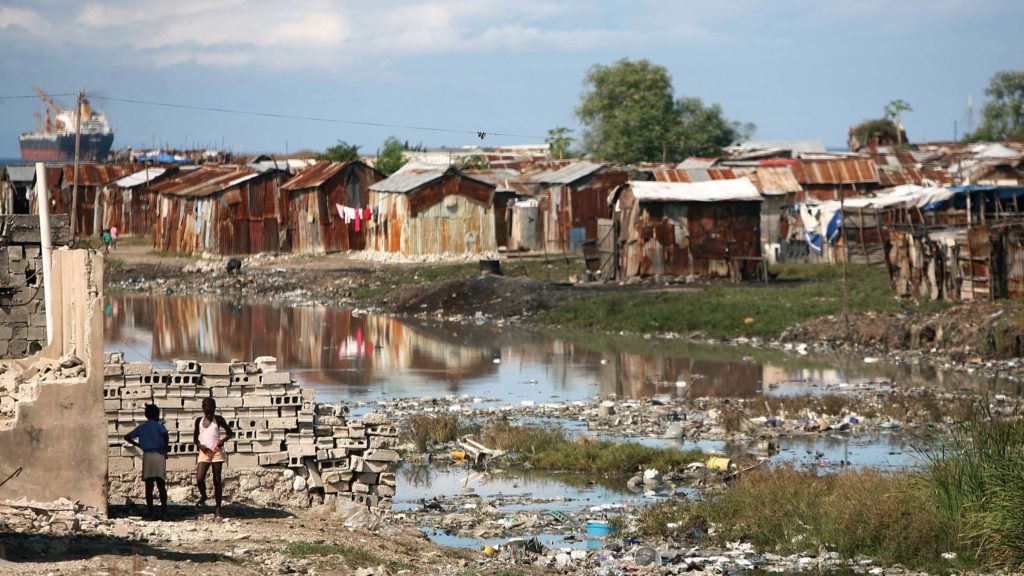
Cite Soleil
That is an incredible story! How wonderful that it had such a positive outcome. Let’s talk about what you do at the health center. What services do you provide here?
The facility provides free, comprehensive services for pregnant women and children five and under. The days at the center are busy, filled with prenatal visits, immunizations, and consultations for sick children. Currently the center treats about 250 patients every day from 7am until 2pm– although we usually stay open later because we don’t like to turn anyone away. We have to be flexible.
We also have a malnutrition support program that caters specifically to families with children who are identified as underweight and in the “red zone” when we measure the circumference of their upper arms.
We work with Haiti’s Ministry of Health to provide infants and toddlers with Plumpy Nut – a peanut-based paste fortified with vitamins and minerals that helps to treat severe acute malnutrition. We also have a “lunch club” which offers the children an additional on-site meal, oh, and we run a preschool!
What brings most children into the health center?
The children come in with many different illnesses: fever, diarrhea, vomiting, flu, intestinal infections, skin rashes and infections, worms, and malnutrition are among the most common. We’re not able to provide emergency services so we have to refer those cases to partner health facilities.
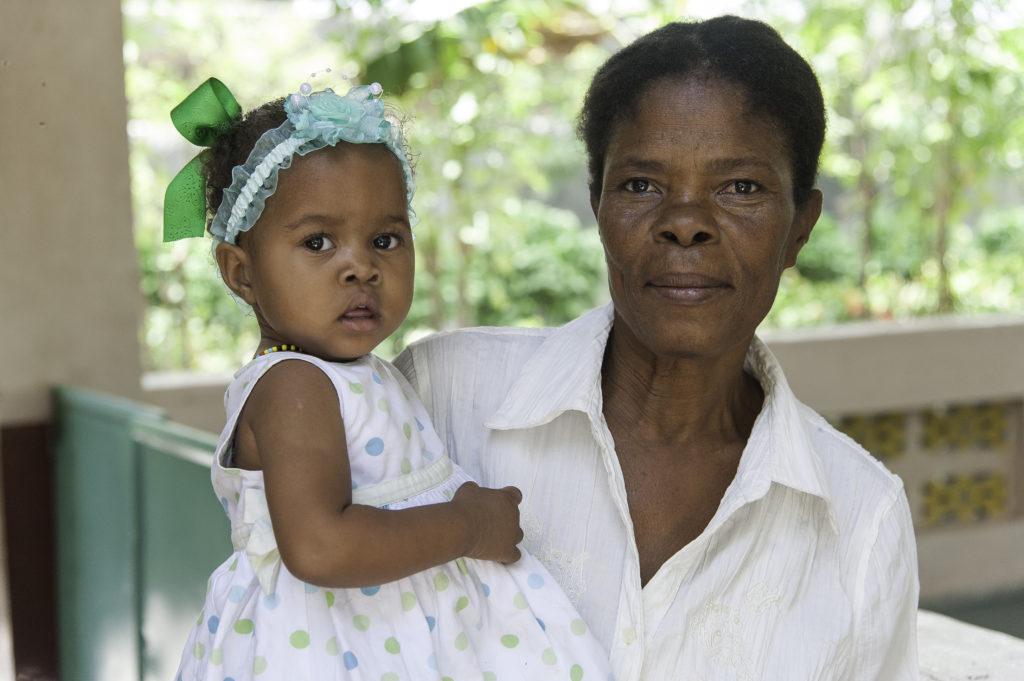
Christafa, a patient at the health center and her grandma during a visit
How does the center support women through their pregnancy?
Apart from the very important pre-and-postnatal care that we offer, much of our work with pregnant women has to do with HIV. All pregnant women who visit this center are screened for HIV and their partners are asked to participate in voluntary screenings, as well. It’s critical that all pregnant women who come for care know their HIV status. Any mother testing positive is enrolled in antiretroviral (ART) care to prevent the transmission of the virus to her baby and is encouraged to deliver at our partner hospital just across the street. Thanks to this, we see very few babies born HIV positive.
We also run a support group for HIV positive moms that provides psycho-social support and a safe place for mothers to meet and talk with women who face the same challenges and stigma.
You’ve seen a lot of patients in your years here, so I realize this next question may be a hard one to answer. But, is there one patient, one experience that stands out as particularly memorable?
Yes, indeed a challenge. Well, we see many children with malnutrition here but I will never forget a baby so small that we would say to one another “you could slip her into your pocket.” She was incredibly tiny – like the baby from the fairy tale “Thumbelina.” At six months, she weighed less than six pounds. We treated her for malnutrition and provided nutrition support for five months until we started to see her gain weight. We continued to see this little girl for another three years, monitoring her growth and weight. We have watched her grow across her entire childhood. I like to remember stories like these – the cases where things were very bad and then things got better. Her family enrolled her at our school when she was five – in our kindergarten – and she just graduated this June at the end of 7th grade.
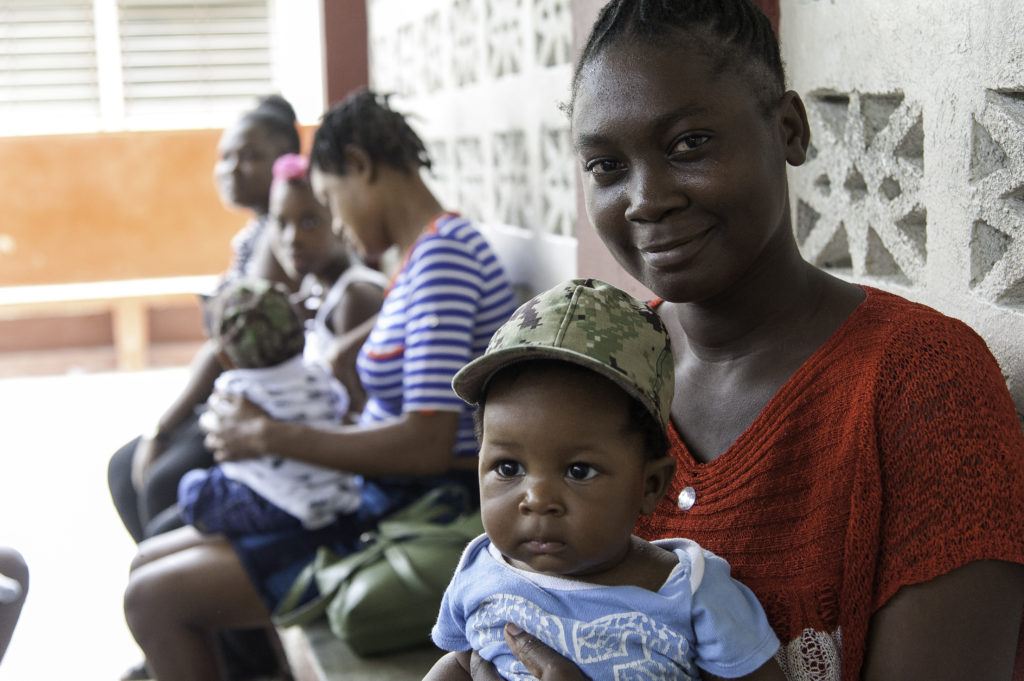
Avilie received prenatal care at the health center and brings her baby, Gerardson now for regular appointments and immunizations
You receive medicine and medical supplies from CMMB’S Medical Donations Program. How do these donations help women and children here?
The pharmaceutical donations from CMMB’s medical donations program are essential to our onsite pharmacy. One of the most important things we receive are vitamins from Vitamin Angels, which really help us provide better prenatal care and nutritional support for sick children. Prenatal vitamins cannot be found in Haiti – not in a regular pharmacy or even a market. These vitamins are rare commodities and women who don’t have enough to eat really need them to safe pregnancies and healthy babies.
If it was not for CMMB and Vitamin Angels, the women and children here would not get those important vitamins. We are so grateful for these donations. They make a big difference.

Sister Cecilia and a CMMB donated bottle of vitamins from Vitamin Angels
Do you have a message for CMMB donors?
The generosity and love of the CMMB donors allow us to do all the good things we do here to take good care of pregnant women and children who live in a very poor, under-served community that is plagued by crime and violence. The services we provide exist only because we have support from partners like CMMB. The CMMB donors pay the salaries of three of our nurses, one of our lab technicians and two nurses aids.
I would like donors to know that their generosity truly serves the poorest of the poor here in Cité Soleil.
